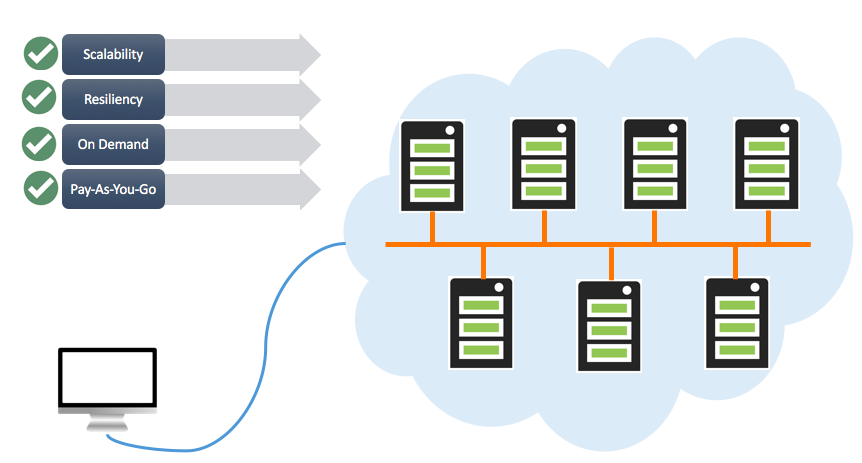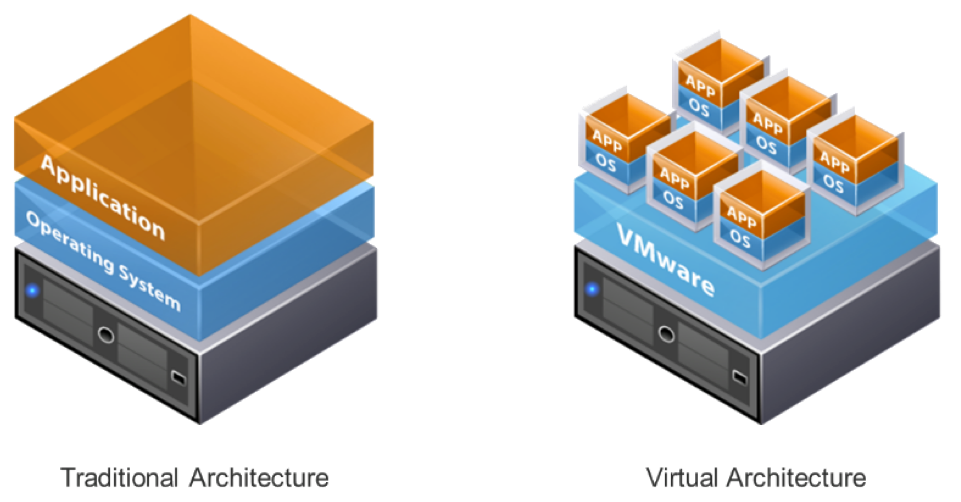Cloud servers offer many benefits and are now very popular in the world of hosting. A dedicated server is still a favorite for those looking for traditional and reliable hosting. What’s better for hosting your website or web application? To choose between cloud server and dedicated server, you should first understand how these two models operate.
In this article, we’ll explain these server hosting models and help you make a clear distinction between them. We’ll also touch briefly on the more popular and affordable VPS (Virtual Private Server) hosting.
What’s A Cloud Server And How Does It Work?
A cloud server is built and delivered over the internet based on an IT paradigm called cloud computing. Cloud computing, also referred to as “the cloud,” is the delivery of computing storage, servers, databases, software and other computing services over the internet.
Cloud Servers – Features And Benefits
With cloud servers, you’re not working on a single dedicated server. There’s a physical pool of hardware resources from many servers and networks distributed across several data centers. Your cloud server is a virtual server (virtualized from a physical pool of multiple server resources), running in a distributed computing environment and delivered over the internet.

Cloud Hosting: Features And Benefits
Cloud Hosting
As shown in the above figure, a cloud platform is made of several physical servers forming a pool of resources. Several virtual servers are constructed with this underlying pool, and each of these virtual servers is a cloud server.
Cloud hosting refers to hosting on such virtual servers, with resources pooled from underlying physical servers. Such an offering delivers several benefits especially for businesses with fluctuating scale of operations.
Scalability
The cloud server is fundamentally a software construct and is easy to create and manage. You can allocate additional resources or deallocate unused resources automatically or manually within seconds.
Pay-As-You-Go And On-Demand
In the cloud model, you aren’t purchasing any standard server provisioning. A cloud server is responsive to your needs and supplies you with infrastructure on-demand.
You pay as you go, and pay for what you need, based on your resource consumption. Cloud providers typically charge you by the hour, week, fortnight or month.
Resiliency
There’s no single point of failure with a well-designed cloud. With the correct approach, the cloud computing model offers resiliency and very high availability. For businesses running 24/7 operations and requiring a reliable solution without disruptions and downtime, the cloud is the best option.
What’s The Difference Between Cloud Servers And VPS?
The concept of virtual servers (virtualization) in the cloud is not the same as virtualization in VPS hosting. From an end-user perspective, they may appear alike, but technically they aren’t. In VPS hosting, similar to the cloud, infrastructure like servers, storage, etc. are shared across tenants.
Server Virtualization
Server virtualization, a concept of running multiple Virtual Machines (VMs) on top of a single physical server, using virtualization software. The virtualization software enables abstraction of the physical resources and slices a single server into multiple virtual servers.

VPS Hosting refers to hosting your website or applications on such VMs (with one underlying physical server). VPS hosting may cost you less, but it doesn’t offer maximum availability, flexibility and scalability that you get with the cloud.
However, with the cloud model, you host your site or app on a virtual cloud server (with multiple physical servers networked to form a cluster) with the benefits of scalability and high-availability.
What’s A Dedicated Server And How Does It Work?
Dedicated Server refers to one physical server that is dedicated for the sole use of your organization, either rented out or purchased. All resources of a dedicated server are exclusively available for your use.

Dedicated Servers – Features And Benefits
Traditionally, dedicated servers have been the preferred choice for large enterprises and businesses requiring high performance, data security and predictable demand.
Exclusivity And Configurability
Since the server is for your exclusive usage, you can configure it to meet your exact specifications. You can choose the RAM, processor and storage to suit your needs.
High Performance And Input/Output (I/O)-Intensive
If your business is I/O-intensive, i.e., if your applications require reading and writing a significant amount of data you’ll need dedicated hardware for good performance. Dedicated servers are great for such requirements.
Data Security
For stringent data security and compliance with regulations, dedicated hardware is the right choice. If your top priority is keeping your data and information safe, invest in a dedicated server and make sure you keep your software updated.
Cloud Server vs. Dedicated Server – Comparative Summary
Another drawback of a dedicated server is that you’ll be unable to upgrade it without going offline. You’ll have to schedule a maintenance window if you need to upgrade the RAM or CPU or disk space.
| Feature | Dedicated Server | Cloud Server |
IT Investment |
Businesses using dedicated servers will require a high level of IT expertise and initial investment. | Cloud servers require lesser expenses than traditional servers, especially since you can compartmentalize your resources by function.
⭐ |
Setup Time |
It may take weeks to set up a dedicated server, depending on your requirements. | You can go online within minutes.
⭐ |
Scalability |
Another drawback of a dedicated server is that you’ll be unable to upgrade it without going offline. You’ll have to schedule a maintenance window if you need to upgrade the RAM or CPU or disk space. | The cloud model allows you to scale with maximum possible uptime. It’s also less expensive to auto-scale and auto-provision in a cloud environment because there are many community-driven tools. ⭐ |
High Availability (HA) |
Dedicated servers can offer High Availability if you can set up multiple servers with a load balancer. The only drawback is that it’s expensive to configure HA environment in this model.
⭐ |
One of the main advantages of the cloud is that you can achieve HA quickly and with lesser expenses than most other hosting models.
⭐ |
Data Security |
If security is your priority, then the best choice for you is a dedicated server (with maximum protection).
⭐ |
Security has always been a challenge with the cloud model. You’ll have to follow stringent measures to secure your data. |
Exclusivity |
You should host your applications or site on a dedicated server if exclusivity is a requirement.
⭐ |
There’s no exclusivity with the public cloud. The alternative is to go for a private cloud which is very expensive. |
Manageability |
Dedicated servers require skill and time for management. | Cloud servers are compatible with iOS and Android making them easily manageable from your mobile phones!
⭐ |
So what’s better? Knowing the pros and cons of a dedicated server and a cloud server, you should choose the option that best fits your needs.If you need to know more about web hosting options or if you require assistance with server management, our DayDigital experts can help you. Call now for a free consultation!






